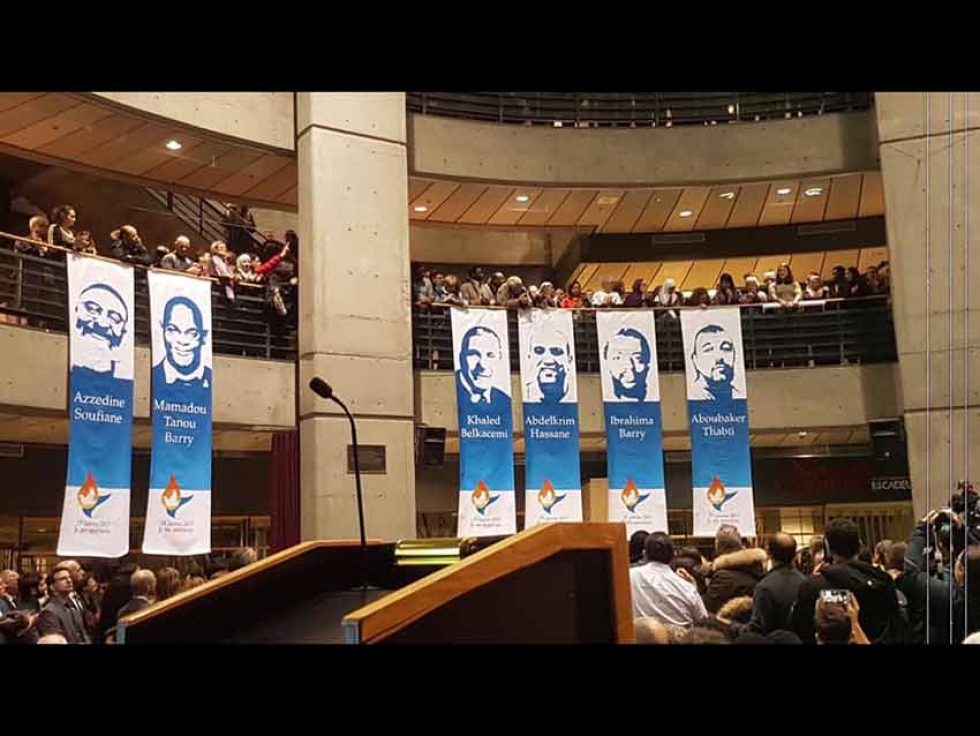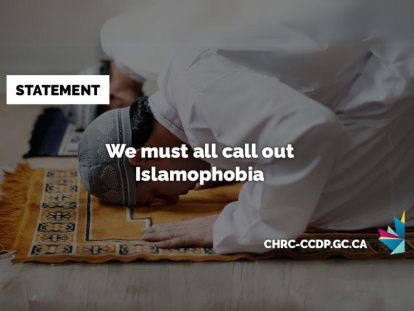 The victims of the Quebec mosque shooting are remembered in Quebec City on January 29, 2019.
The victims of the Quebec mosque shooting are remembered in Quebec City on January 29, 2019.
Feb
Two Years and a Verdict Later: What Next for Muslims in Canada After the Quebec Mosque Shooting?
Written by Chelby DaigleOn February 8th, Alexandre Bissonnette was sentenced to 40 years in prison before being eligible for parole for the murder of Ibrahima Barry, Mamadou Tanou Barry, Khaled Belkacemi, Aboubaker Thabti, Abdelkrim Hassane, and Azzedine Soufiane, and the attempted murder of 35 other worshippers, in the attack at the Centre Culturel Islamique de Québec (CCIQ) on January 29, 2017.
As he handed down the sentence, Justice Huot reiterated the devastating impact of Bissonnette’s hateful actions on the survivors, the families of the victims and the mosque community in Quebec City, stating that January 29 will be a day 'written in blood' in the history of Canada and Quebec.
Justice Huot recognized the attack as a hate crime, saying it was caused by a 'visceral hatred for immigrants who are Muslim' and 'tore at the fabric of society.'"
According to the Globe and Mail, "Justice Francois Huot rejected the Crown’s call to sentence Bissonnette to 150 years with no chance of parole, arguing a sentence of 50 years or more would constitute cruel and unusual punishment under the Canadian Charter of Rights and Freedoms. Sentences that exceed an offender’s life expectancy and offer no reasonable hope of release are “grossly disproportionate and totally incompatible with human dignity,” he wrote in his 246-page decision."
The survivors of the Quebec mosque attack and the families of those who were murdered were generally disappointed with the sentencing. “I was very disappointed and surprised,” said Aymen Derbali in an interview with the Montreal Gazette, "We wanted justice to be done, for the victims for all those who are dead,” Derbali said, noting based on what the judge decided, Bissonnette will be eligible for parole at age 67, “Why did he (the judge) pick 40 years? Why didn’t he pick 50 years or two 25-year sentences? We were very upset after this sentence.”
There is also concern that the sentence will impact the activities of far-right hate groups in the country. In a post-sentencing CBC interview, Barbara Perry, director of the Centre on Hate, Bias and Extremism at the University of Ontario Institute of Technology, explains "if you think back to when the murders occurred, within the first few days after the murders there was an uptick in anti-Muslim violence in response. So I wouldn't be at all surprised if we see a bit of an uptick here as well. As the first one was taken as a call to arms, I think that the sentencing decision will also be taken as a similar call to arms and, you know, an opportunity to unite around Islamophobia which really the right has been doing quite consistently for the past couple of years.That really has become the lightning rod for them."
In an article for The Conversation Canada, Professor Jasmine Zine explains that "Statistics Canada found hate crimes against Muslims in Canada grew 253 per cent from 2012 to 2015. It got even worse: police-reported general hate crimes shot up by 50 per cent in 2017 reaching a new all-time high. These numbers are largely driven by incidents targeting Muslim, Jewish and Black people with the increases being driven mainly by events in Ontario and Québec. Muslims have been constructed as the “enemies within” and represent the new folk devils that threaten the stability of the nation."
The opportunity for the Federal government to designate January 29 as a National Day of Remembrance of the Quebec Mosque shooting has once again past Justin Trudeau's Liberals by. This despite the fact that this was the recommendation of the House of Commons Heritage committee back in 2018.
There were differences of opinion within the Muslim community about what this proposed day should be called. The National Council of Canadian Muslims (NCCM) called for a "National Day of Action against Hate and Intolerance" whereas the "I Remember January 29" campaign, managed by the Canadian Muslim Forum (FMC-CMF) and Canadians for Justice and Peace in the Middle East (CJPME), both based in Montreal, Quebec, called for a "National Day of Remembrance and Action on Islamophobia and other forms of religious discrimination". But this difference doesn't seem like a good enough reason to prevent the Federal government from making the designation. However, based on a survey by the Calgary-based think tank, Think for Actions, many Canadians reject such a designation so perhaps this explains the Liberals' reluctance. But as anti-Muslim sentiment and hate incidents are already rising this election year, this lack of concrete action by the federal government is not a good sign of what may be to come for our communities.
Despite the lack of action at the federal level, cities such as Toronto and Hamilton have already made this designation and commemorative events for January 29th took place at the municipal level in cities across Canada this year including Calgary, Winnipeg, London, Kitchener, Ottawa, Gatineau, and of course Quebec City.
Often we focus on politicians to lead the way in these circumstances, but perhaps we should look to other sectors of society.
This year also saw the launch of the Push Back the Darkness initiative by Ryan Slobojan and his daughter Elisabeth from Pickering, Ontario. Ryan helped to support vigils to commemorate January 29th in Pickering, Whitby, Brampton, Mississauga, Calgary, and in Ottawa. Ryan and Elisabeth came to Ottawa for the vigil on Parliament Hill where they supplied LED candles to attendees with a message of hope. The week before they visited Quebec City and Centre Culturel Islamique de Québec where the shooting took place.
-
 Mamadou Tanou Barry, 42
Mamadou Tanou Barry, 42
Mamadou Tanou Barry, 42
Mamadou Tanou Barry, 42
-
 Montreal: Muslim Awareness Week
Montreal: Muslim Awareness Week
Montreal: Muslim Awareness Week
Montreal: Muslim Awareness Week
-
 Portraits of the Quebec Mosque Shooting Victims
Portraits of the Quebec Mosque Shooting Victims
Portraits of the Quebec Mosque Shooting Victims
Portraits of the Quebec Mosque Shooting Victims
-
 Abdelkrim Hassane, 41
Abdelkrim Hassane, 41
Abdelkrim Hassane, 41
Abdelkrim Hassane, 41
-
 Winnipeg: Islamic Social Services Association
Winnipeg: Islamic Social Services Association
Winnipeg: Islamic Social Services Association
Winnipeg: Islamic Social Services Association
-
 Aboubaker Thabti, 44
Aboubaker Thabti, 44
Aboubaker Thabti, 44
Aboubaker Thabti, 44
-
 Azzeddine Soufiane, 57
Azzeddine Soufiane, 57
Azzeddine Soufiane, 57
Azzeddine Soufiane, 57
-
 Quebec City: Azzeddine Soufiane Awarded for Heroism
Quebec City: Azzeddine Soufiane Awarded for Heroism
Quebec City: Azzeddine Soufiane Awarded for Heroism
Quebec City: Azzeddine Soufiane Awarded for Heroism
-
 Push Back the Darkness: Ryan and Elisabeth
Push Back the Darkness: Ryan and Elisabeth
Push Back the Darkness: Ryan and Elisabeth
Push Back the Darkness: Ryan and Elisabeth
-
 Ottawa: Shahad Khalladi
Ottawa: Shahad Khalladi
Ottawa: Shahad Khalladi
Ottawa: Shahad Khalladi
-
 Ottawa: Minister Ahmed Hussen speaks on Parliament Hill
Ottawa: Minister Ahmed Hussen speaks on Parliament Hill
Ottawa: Minister Ahmed Hussen speaks on Parliament Hill
Ottawa: Minister Ahmed Hussen speaks on Parliament Hill
-
 Montreal: Montreal City Hall
Montreal: Montreal City Hall
Montreal: Montreal City Hall
Montreal: Montreal City Hall
-
 Brampton: Brampton City Hall
Brampton: Brampton City Hall
Brampton: Brampton City Hall
Brampton: Brampton City Hall
-
 Mississauga: Mississauga City Hall
Mississauga: Mississauga City Hall
Mississauga: Mississauga City Hall
Mississauga: Mississauga City Hall
-
 Khaled Belkacemi, 60
Khaled Belkacemi, 60
Khaled Belkacemi, 60
Khaled Belkacemi, 60
-
 Ibrahima Barry, 39
Ibrahima Barry, 39
Ibrahima Barry, 39
Ibrahima Barry, 39
-
 Hamilton: Muslim Council of Greater Hamilton
Hamilton: Muslim Council of Greater Hamilton
Hamilton: Muslim Council of Greater Hamilton
Hamilton: Muslim Council of Greater Hamilton
-
 Gatineau: Centre Islamique de l'Outaouais
Gatineau: Centre Islamique de l'Outaouais
Gatineau: Centre Islamique de l'Outaouais
Gatineau: Centre Islamique de l'Outaouais
-
 Calgary: Muslim Council of Calgary
Calgary: Muslim Council of Calgary
Calgary: Muslim Council of Calgary
Calgary: Muslim Council of Calgary
https://mail.muslimlink.ca/news/two-years-and-a-verdict-later-what-next-for-muslims-in-canada-after-the-quebec-mosque-shooting#sigProId3686f5f9a0
This article was produced exclusively for Muslim Link and should not be copied without prior permission from the site. For permission, please write to info@muslimlink.ca.
















